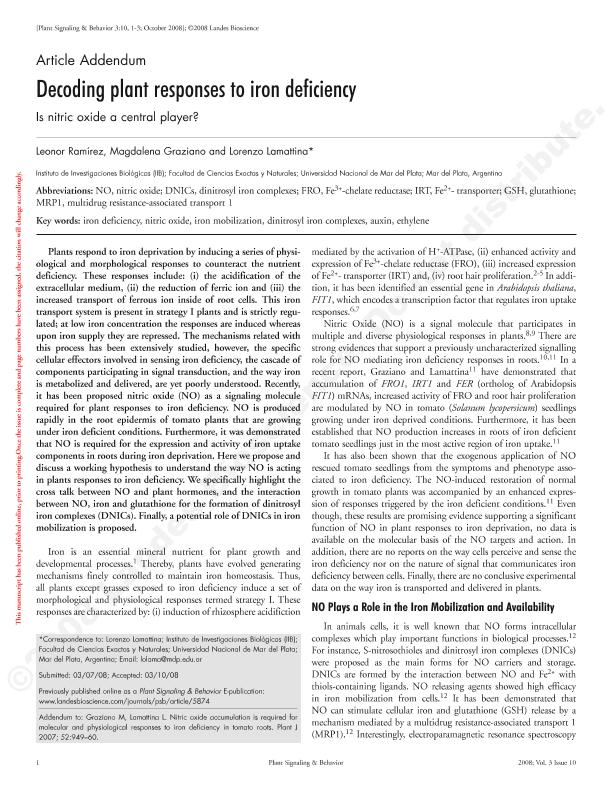Mostrar el registro sencillo del ítem
dc.contributor.author
Ramírez, Leonor

dc.contributor.author
Graziano, Magdalena
dc.contributor.author
Lamattina, Lorenzo

dc.date.available
2021-06-23T19:06:47Z
dc.date.issued
2008-10
dc.identifier.citation
Ramírez, Leonor; Graziano, Magdalena; Lamattina, Lorenzo; Decoding plants adaptive responses to iron deficiency: Is Nitric Oxide a central player?; Landes Bioscience; Plant Signaling & Behavior; 3; 10; 10-2008; 795-797
dc.identifier.issn
1559-2324
dc.identifier.uri
http://hdl.handle.net/11336/134783
dc.description.abstract
Plants respond to iron deprivation by inducing a series of physiological and morphological responses to counteract the nutrient deficiency. These responses include: (i) the acidification of the extracellular medium, (ii) the reduction of ferric ion and (iii) the increased transport of ferrous ion inside of root cells. This iron transport system is present in strategy I plants and is strictly regulated; at low iron concentration the responses are induced whereas upon iron supply they are repressed. The mechanisms related with this process has been extensively studied, however, the specific cellular effectors involved in sensing iron deficiency, the cascade of components participating in signal transduction, and the way iron is metabolized and delivered, are yet poorly understood. Recently, it has been proposed nitric oxide (NO) as a signaling molecule required for plant responses to iron deficiency. NO is produced rapidly in the root epidermis of tomato plants that are growing under iron deficient conditions. Furthermore, it was demonstrated that NO is required for the expression and activity of iron uptake components in roots during iron deprivation. Here we propose and discuss a working hypothesis to understand the way NO is acting in plants responses to iron deficiency. We specifically highlight the cross talk between NO and plant hormones, and the interaction between NO, iron and glutathione for the formation of dinitrosyl iron complexes (DNICs). Finally, a potential role of DNICs in iron mobilization is proposed.
dc.format
application/pdf
dc.language.iso
eng
dc.publisher
Landes Bioscience
dc.rights
info:eu-repo/semantics/openAccess
dc.rights.uri
https://creativecommons.org/licenses/by-nc-sa/2.5/ar/
dc.subject
IRON DEFICIENCY
dc.subject
NITRIC OXIDE
dc.subject
IROB MOBILIZATION
dc.subject
AUXIN
dc.subject.classification
Biología Celular, Microbiología

dc.subject.classification
Ciencias Biológicas

dc.subject.classification
CIENCIAS NATURALES Y EXACTAS

dc.title
Decoding plants adaptive responses to iron deficiency: Is Nitric Oxide a central player?
dc.type
info:eu-repo/semantics/article
dc.type
info:ar-repo/semantics/artículo
dc.type
info:eu-repo/semantics/publishedVersion
dc.date.updated
2021-02-18T15:47:45Z
dc.journal.volume
3
dc.journal.number
10
dc.journal.pagination
795-797
dc.journal.pais
Estados Unidos

dc.journal.ciudad
Austin
dc.description.fil
Fil: Ramírez, Leonor. Consejo Nacional de Investigaciones Científicas y Técnicas. Centro Científico Tecnológico Conicet - Mar del Plata. Instituto de Investigaciones Biológicas. Universidad Nacional de Mar del Plata. Facultad de Ciencias Exactas y Naturales. Instituto de Investigaciones Biológicas; Argentina
dc.description.fil
Fil: Graziano, Magdalena. Consejo Nacional de Investigaciones Científicas y Técnicas. Centro Científico Tecnológico Conicet - Mar del Plata. Instituto de Investigaciones Biológicas. Universidad Nacional de Mar del Plata. Facultad de Ciencias Exactas y Naturales. Instituto de Investigaciones Biológicas; Argentina
dc.description.fil
Fil: Lamattina, Lorenzo. Consejo Nacional de Investigaciones Científicas y Técnicas. Centro Científico Tecnológico Conicet - Mar del Plata. Instituto de Investigaciones Biológicas. Universidad Nacional de Mar del Plata. Facultad de Ciencias Exactas y Naturales. Instituto de Investigaciones Biológicas; Argentina
dc.journal.title
Plant Signaling & Behavior
dc.relation.alternativeid
info:eu-repo/semantics/altIdentifier/doi/http://dx.doi.org/10.4161/psb.3.10.5874
Archivos asociados
